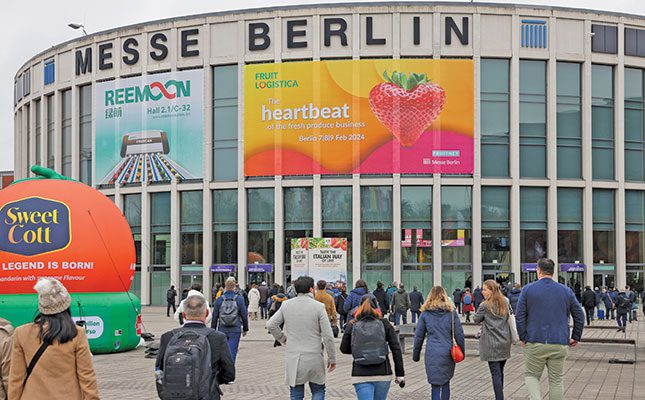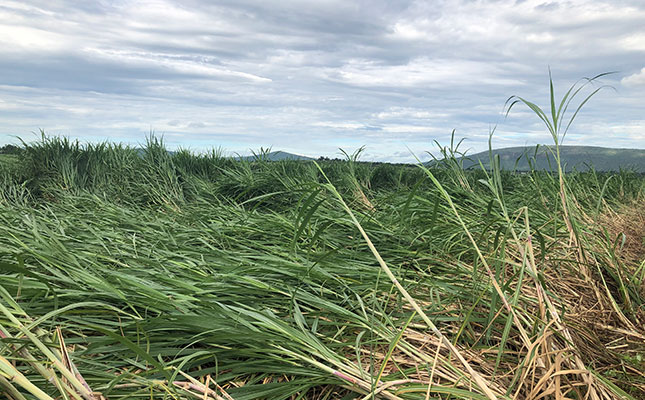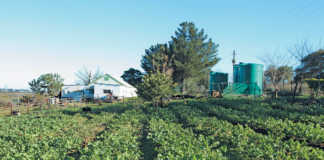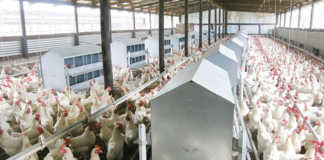
Photo: Messe Berlin Gmbh
Fruit Logistica, the fruit and vegetable trade show annually hosted in Berlin, Germany, hosted more than 2 770 exhibitions, with at least 24 000 staff, and over 66 000 visitors from 145 countries this year.
While the show serves as a valuable networking platform and allows industries to familiarise themselves with the latest technological advancements, it also offers great insights into new market trends and concerns.
READ SA’s export fruit industry: Why market relationships are key to future success
AJ Griesel, CEO of the South African Table Grape Industry, told Farmer’s Weekly that logistical challenges emerged as a huge concern for almost everyone.
“The COVID-19 pandemic, followed by the war in Ukraine and now the Red Sea crisis, exposed the fragmented nature and vulnerabilities of international logistics, with many countries, not only South Africa, now struggling with logistical challenges,” Griesel said.
He added that various ideas emerged from the trade show on ways to tackle these challenges, but the viability of these and whether they would be able to alleviate South Africa’s logistics problems, especially at the country’s ports, remained to be seen.
Griesel said there was also a strong anti-plastic movement, aimed at reducing packaging waste and promoting the reuse, recycling and other forms of recovering packaging waste.
“South Africa will have to adapt to this movement to maintain its footprint, especially in European markets,” added Griesel.
Meanwhile. Roelf Pienaar, managing director of TruCape, said talks with European and UK buyers reflected deep concerns over exporters’ abilities to service market programmes timeously, because of problems at South African ports.
“We need to carefully navigate port challenges to ensure our fruit arrive on time in markets, otherwise the retailers lose money because they are sitting with empty shelves.
Problems at South African ports are a huge headache for the South African fruit industry, and significantly driving up production costs,” he said.
On the positive side, Pienaar said that it was evident that UK and EU apple and pear supplies were low, which created an opportunity for South African farmers to supply these markets earlier than usual.
READ The importance of good business and operations plans
He said it was still too early to predict how this would affect apple and pear prices.
Geopolitics emerged as another big uncertainty in the equation.
Pienaar explained that the conflict in Ukraine and the Red Sea was making it more difficult for some countries to service certain markets, while creating opportunities for others to fill these gaps.
Variety and technology
Jacques Jordaan, general manager of the South African Plant Improvement Organisation (SAPIO), said he was particularly impressed by the mass of fruit and vegetable varieties under plant breeders’ rights on exhibition.
“The big drive is to satisfy consumers’ needs for ‘something new’. The challenge for farmers will be to identify varieties that will thrive under their unique production conditions,” he said.
In terms of new technologies, there were 70 entries to the Fruit Logistica Innovation Awards (FLIA) this year. The FLIA award went to Unica Fresh for its Zucchiolo, a new zucchini, or egg plant, variety.
Another interesting nominee in this category was Infuseo’s Naked Avocado range. Harvested at the right time, the fruit has a 30-day refrigerated shelf life and is free from preservatives, acidifiers and additives.
Fruit Logistica for the first time this year awarded a prize for innovations in machinery and technology, which went to Koppert for its Mirical packaging concept.
The Mirical predatory bug combats whitefly, which frequently infests greenhouse vegetables.
Other interesting nominees in this category included the Optical Roto-cut vegetable trimmer made by Wyma Solutions.
The AI-controlled trimmer has the potential to cut labour by 80% and waste by 20%.













